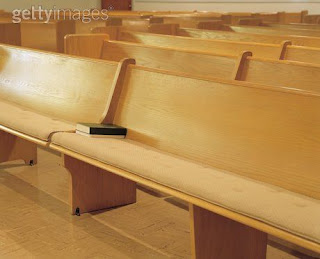 A new study shows christianity is plummeting in America, while the number of non-believers is steadily increasing. There is some good news sprinkled in, but some serious "soul-searching" needs to be done if these trends are to be believed - and I see no reason why they shouldn't. A few thoughts below from Bruce Feiler, host of the PBS series on "Walking the Bible" and author of the forthcoming book "America's Prophet: Moses and the American Story."
A new study shows christianity is plummeting in America, while the number of non-believers is steadily increasing. There is some good news sprinkled in, but some serious "soul-searching" needs to be done if these trends are to be believed - and I see no reason why they shouldn't. A few thoughts below from Bruce Feiler, host of the PBS series on "Walking the Bible" and author of the forthcoming book "America's Prophet: Moses and the American Story."A shocking new study of Americans’ religious beliefs shows the beginnings of a major realignment in Americans’ relationship with God. The American Religious Identification Survey (ARIS) reveals that Protestants now represent half of all Americans, down almost 20 percent in the last twenty years. In the coming months, America will become a minority Protestant nation for the first time since the pilgrims.
The number of people who claim no religious affiliation, meanwhile, has doubled since 1990 to fifteen percent, its highest point in history. Non-believers now represent the third-highest group of Americans, after Catholics and Baptists.
Other headlines:
1) The number of Christians has declined 12% since 1990, and is now 76%, the lowest percentage in American history.
2) The growth of non-believers has come largely from men. Twenty percent of men express no religious affiliation; 12% of women.
3) Young people are fleeing faith. Nearly a quarter of Americans in their 20’s profess no organized religion.
4) But these non-believers are not particularly atheist. That number hasn’t budged and stands at less than 1 percent. (Agnostics are similarly less than 1 percent.) Instead, these individuals have a belief in God but no interest in organized religion, or they believe in a personal God but not in a formal faith tradition.
The implications for American society are profound. Americans’ relationship with God, which drove many of the country’s great transformations from the pilgrims to the founding fathers, the Civil War to the civil rights movement, is still intact. Eighty-two percent of Americans believe in God or a higher power.
But at the same time, the study offers yet another wake-up call for religious institutions.
First, catering to older believers is a recipe for failure; younger Americans are tuning out.
Second, Americans are interested in God, but they don’t think existing institutions are helping them draw closer to God.
Finally, Americans’ interest in religion has not always been stable. It dipped following the Revolution and again following Civil War. In both cases it rebounded because religious institutions adapted and found new ways of relating to everyday Americans.
Today, the rise of disaffection is so powerful that different denominations needs to band together to find a shared language of God that can move beyond the fading divisions of the past and begin moving toward a partnership of different-but-equal traditions.
Or risk becoming Europe, where religion is fast becoming an afterthought.


"First, catering to older believers is a recipe for failure; younger Americans are tuning out." Catholic singles are invisible in the Church: when will more parishes recognize we exist?
ReplyDelete